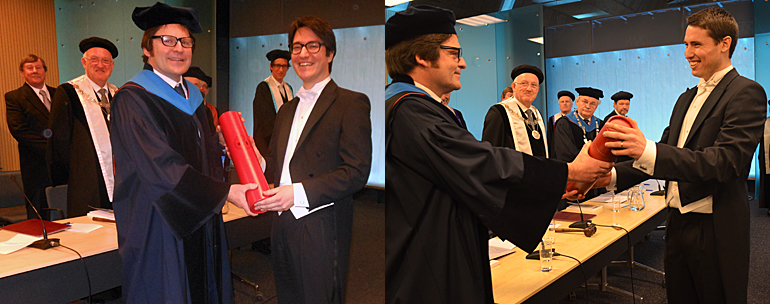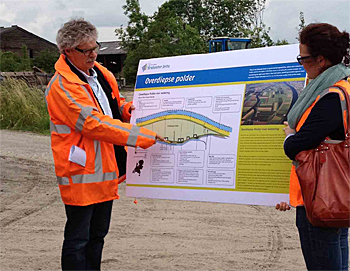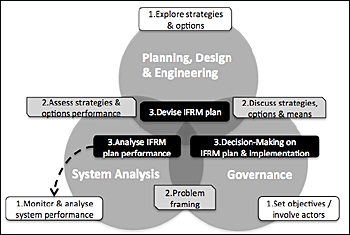Dutch PhD students successfully defend their key findings to effective water governance
 On 14 February 2014, Jeroen Rijke (left) and Sebastiaan van Herk (right) successfully presented and defended their PhD theses and were awarded with a Doctoral degree at the Delft University of technology and Unesco-IHE, the Netherlands.
On 14 February 2014, Jeroen Rijke (left) and Sebastiaan van Herk (right) successfully presented and defended their PhD theses and were awarded with a Doctoral degree at the Delft University of technology and Unesco-IHE, the Netherlands.
Professor Chris Zevenbergen (on photo handing out degrees) was their promoter
Both phD theses concerned effective governance in relation to climate adaptation and flood risk management.
Jeroen Rijke looked at how governments can be successful in adapting water systems. He studied cases of adaptive water management in Australian cities and the case of the Dutch national river widening programme Room for the River.
Sebastiaan van Herk examined how governments reached multiple objectives in management of water projects. He studied four Dutch flood risk management and urban planning projects.

Multi-stakeholder involvement takes some effort in the planning phase but pays off in the implementation Here seen is a field presentation of river widening project Overdiepse Polder to science journalists.
Actively create the necessary circumstances
Jeroen Rijke concludes in his study Delivering change. Towards fit-for-purpose governance of adaptation to flooding and drought that governments must actively create the circumstances to be able to make their rivers and lakes more resilient to flooding and drought.
According to Rijke, the Dutch Room for the River programme shows how planned adaptation projects in multi-stakeholder settings with farmers, nature conservation groups, municipalities, etc. can be managed effectively and how large scale investment programmes can contribute to a transition of a water system that is adapting to a changed context.
Adaptive and transformative
In order to establish water sensitive cities, urban water governance is a matter of continuous learning and making timely decisions. Depending on the circumstances, a different mix of centralised, decentralised, formal and informal approaches can be considered more favourable.
Rijke considers the Australian city of Adelaide a good example when it almost ran out of water supply in 2006. During the immediate crises the city utilised its informal networks to mobilise and inform quick centralised coordination of responses.
 Van Herk's adapted framework for collaborative planning processes to deliver plans for integrated flood risk management (IFRM).
Van Herk's adapted framework for collaborative planning processes to deliver plans for integrated flood risk management (IFRM).
No stand-alone measures
Sebastian van Herk concludes in his study Delivering Integrated Flood Risk Management, Governance for collaboration, learning and adaptation that flood protection measures alone cannot accommodate the future frequencies and impacts of flooding.
Integrated flood risk management (IFRM) is a portfolio of measures to manage flood risk, but also of land use planning, emergency management and other measures, according to Van Herk.
Collaborative with stakeholders
The implementation of flood risk management policies and projects is not straightforward and is hampered by multiple governance challenges. It requires collaboration between many disciplines and by a group of stakeholders with various and often diverse interests and means.
According to Van Herk IFRM also requires the combination of objectives and funding from different policy domains; and to consider a range of possible option at all spatial scale levels and for various time horizons.
Van Herk emphasizes the importance of a learning-oriented management.
Five top tips for adaptive water governance
Rijke and Van Herk complied a set of five top tips for adaptive water governance:
● Start with a clear integrated vision for all stakeholders to understand the overarching objectives for long term flood control and water conservation
● Consider multiple and diverse interests for providing opportunities for stakeholder to participate
● Adopt fit-for-purpose governance arrangements that balance top-down and bottom-up processes, and learning alliances that embed formal and informal processes.
● Implement structured planning processes with funneled design freedom to be able to enrich solutions but at the same time ensure implementation
● Cultivate adaptive management and continuously learning
Both dissertations can be downloaded from the website of Delft University of technology:
● Delivering change. Towards fit-for-purpose governance of adaptation to flooding and drought
by Jeroen Rijke
● Delivering Integrated Flood Risk Management, Governance for collaboration, learning and adaptation
by Sebastiaan van Herk
More information
Delft University of Technology
Faculty of civil engineering and geosciences
Delft,, the Netherlands
+31 15 278 98 02
www.citg.tudelft.nl/en
Unesco-IHE
Water engineering department
Delft, the Netherlands
+31 15 212 29 21
www.unesco-ihe.org



